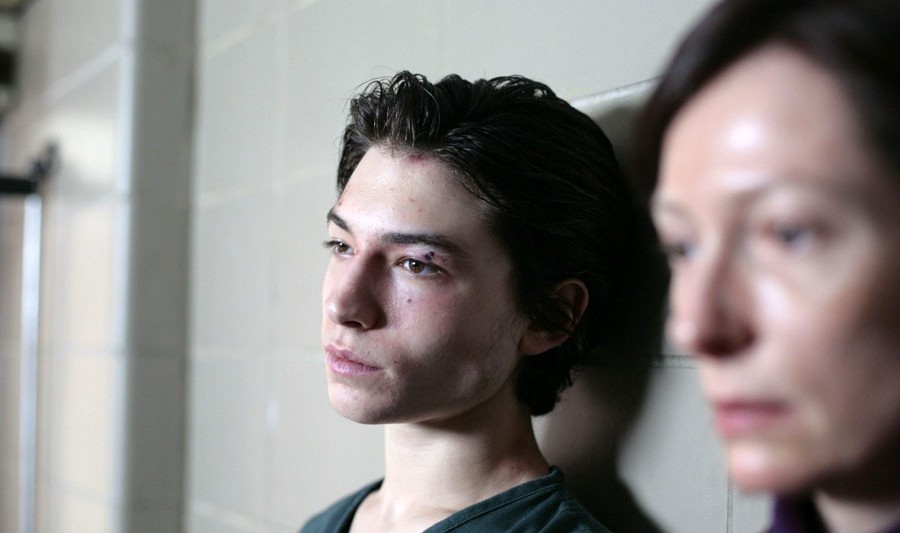| Worth seeing: | if you want a thought provoking family drama, told through striking performances backed by stunning cinematography |

| Director: | Lynne Ramsay |
| Featuring: | Ezra Miller, John C Reilly, Tilda Swinton, Ashley Gerasimovich, Jasper Newell, Kimberley Drummond, Lauren Fox, Leslie Lyles, Rocky Duer, Siobhan Fallon, Ursula Parker |
| Length: | 112 minutes |
| Certificate: | 15 |
| Country: | US |
| Released: | 21st October 2011 |
WHAT’S IT ABOUT?
Eva (Tilda Swinton) doesn’t adapt well to motherhood when her first child, Kevin, comes along.
He’s a late developer, but by the age of three, Kevin (Rocky Duer) is already wilful enough to be more than Eva can handle.
As a six year old (Jasper Newell), Kevin has a mouth dirtier than a back-street pimp and an attitude that would give the summer rioters a run for their money. But on the rare occasions when he shows vulnerability, Eva can’t adapt – she simply doesn’t know what to do.
As a fifteen year old (Ezra Miller), Kevin’s cantankerous nature is all the worse for being tainted by his acquired worldliness. He’s now clever enough to hold Eva at arms length, while cultivating a perfectly normal father-son relationship with his Dad Franklin (John C. Reilly) – thereby alienating Eva from her own family.
But by now, Kevin has a young sister Celia (Ashley Gerasimovich). Eva’s healthy relationship with her daughter serves only to put her failure to connect with Kevin into sharp contrast.
When Celia’s eye is hurt, while Kevin is meant to be looking after her, this is the last straw for Eva, but Franklin takes Kevin’s side, putting the marriage into difficulty.
But when Kevin’s sociopathy has consequences even more horrific than Eva could ever imagine, she’s left wondering whether she could have done anything to stop him – whether she could have done anything to stop him.
WHAT’S IT LIKE?
Adapting Lionel Shriver’s award-winning book of the same name was a long and painful process for the Scottish auteur Lynne Ramsay. It involved changing the structure of the story to make it more cinematic, eschewing the book’s letter-writing for a fractured time-line, visiting the most traumatic periods of Eva’s failed relationship with her son.
It’s a very difficult film to recommend and it’s certainly not a film anyone can like, in the sense of it giving the viewer any enjoyment, satisfaction or emotional relief. It’s very much one of those films where just when you think things can’t possibly get any worse, they do – but in the context of the story, the measured layering of misery on misery is powerful and effective.
The difficulty is that it’s hard to root for anyone; Kevin is so odious that even when he’s being nice (to his father), it’s only to spite his mother, and he comes across as being simply an evil soul, unable to blame a lack of parental love, as even if he didn’t get it from Eva, he got support from Franklin; Franklin is the most down-to-earth of the family, but his apparent naivety, refusal to support Eva and inability to conceive that Kevin might be misbehaving is a little hard to accept; and Eva is so emotionally frigid and passive that she doesn’t make a very sympathetic protagonist.
It takes a brave director to fill a film with so many hopeless and helpless characters, but if that is what she’s trying to achieve, she hits the spot.
Collectively, the boys give us one of cinema’s most brutal characters in years – with the younger actors echoing The Omen’s Damien while Ezra Miller’s pitch-perfect menace takes Harry Enfield’s Kevin the teenager to a whole new, dark level.
There’s so much pain on the screen that it’s emotionally draining, but it’s very much more of an intellectual project than an emotional one; Eva’s inability to show her own emotions makes us turn off our own and view the developments rather clinically.
To say you ‘enjoy’ this film would make you almost as much of a sociopath as Kevin.
It’s impossible to say you like this film, but from the sparse structure, mind-bending cinematography, bitterly sharp script and striking performances, there’s much to admire.
And above all, you’ll certainly need to talk about We Need to Talk about Kevin.
